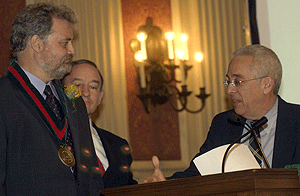Robert E. Blankenship, Ph.D., professor of biology and of chemistry, both in Arts & Sciences, was installed as the first Lucille P. Markey Distinguished Professor March 6 in Holmes Lounge.

“Through the generosity of the Lucille Markey Charitable Trust, we have made great strides in biological and medical research,” Chancellor Mark S. Wrighton said. “Markey’s gifts to the University, of which this professorship is the most recent, are helping us make great scientific advancements and provide our researchers and their programs with support to sustain their work well into the future.”
Blankenship’s research program is primarily concerned with understanding the mechanism of the energy-storing reactions in photosynthetic organisms, as well as understanding the origin and early evolution of photosynthesis. Photosynthesis transforms light, carbon dioxide and water into chemical energy in plants and some bacteria.
The chemical reactions leading to long-term energy storage in photosynthetic systems take place within the membrane-bound reaction center complex and an associated group of proteins that make up an electron transport chain. One of the central goals of Blankenship’s research is to identify the molecular parameters responsible for the fact that essentially every photon, or light packet, absorbed by the system leads to stable products.
The emergence of photosynthesis and other metabolic processes, such as nitrogen fixation, had profound effects on the evolution of advanced life on Earth. Blankenship’s analysis of whole bacterial genomes has shown that these metabolic processes have complex evolutionary histories. Using a combination of genomic, molecular evolution techniques and biochemical analysis, he also has identified and characterized previously unknown enzyme complexes with novel activities.
A new research interest for Blankenship is scientific literacy with an emphasis on understanding the attitudes and preconceptions that non-science students have about science and how those ideas change upon exposure to a course in liberal arts chemistry, as well as the special challenges involved in biochemistry education.
“Having Bob Blankenship in our departments of biology and chemistry brings both groups closer together. He has a true dual appointment in Arts & Sciences with labs and students in both departments. This shows a strong commitment to interdisciplinarity that is one of our hallmarks,” noted Edward S. Macias, Ph.D., executive vice chancellor, dean of Arts & Sciences and the Barbara and David Thomas Distinguished Professor in Arts & Sciences. “He is internationally known in the field of biochemistry and we are fortunate to have him on our faculty.”
Blankenship taught at Arizona State University for 21 years before coming to Washington University in 2006. Prior to that, he was on the faculty of Amherst College for six years. He was a postdoctoral fellow at the University of Washington from 1976-79, and an assistant professor at the American University of Beirut from 1975-76.
He earned a doctorate from the University of California, Berkeley, in 1975 and a bachelor’s degree in 1970 from Nebraska Wesleyan University.
The Lucille P. Markey Charitable Trust established this distinguished professorship to commemorate Markey and her interest in basic medical research. Born Lucille Parker in 1896, her life-long passion was horse breeding and racing. In 1952, she married Admiral Gene Markey, a novelist, screenwriter and film producer. Her desire to reduce suffering from physiological disability led to the establishment of the Lucille P. Markey Charitable Trust.
Since its inception in 1984, the Lucille P. Markey Charitable Trust has provided substantial support to the University. In addition to the professorship, the Trust supports the pioneering Markey Special Emphasis Pathway in Human Pathology, a two-year program offered by the Division of Biology and Biomedical Science, administered jointly by Arts & Sciences and the School of Medicine. The Pathway program offers graduate and postdoctoral fellows the ability to probe deeper into the nature of disease.
Among the trustees for the Lucille P. Markey Charitable Trust is Washington University emeritus trustee and past chair of the School of Medicine’s National Council Robert J. Glaser, M.D. He joined the Markey Trust in 1984 as director of medical science and trustee. A strong, personal supporter of the University, he established the Dr. Robert J. Glaser Distinguished University Professorship in 2001.